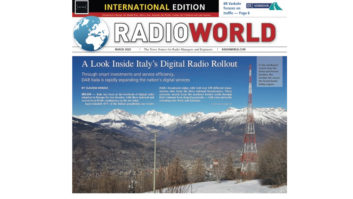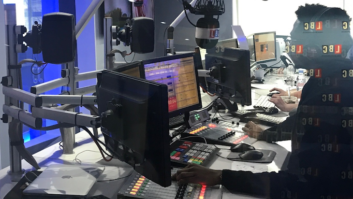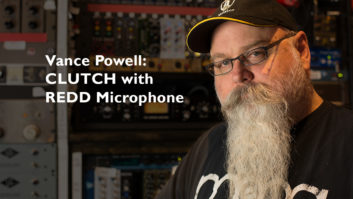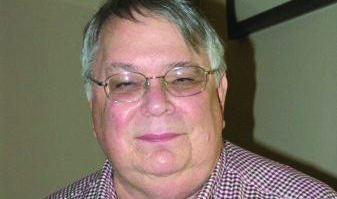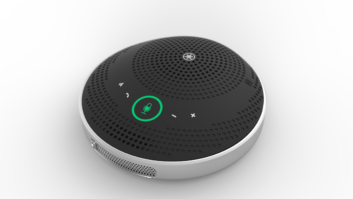The author is communications manager for Radiodays Europe.
COPENHAGEN — Have you seen the YouTube clip of two Glaswegians with strong Scottish accents trying to work the voice controls in a lift? Or the lady sitting in a mid-range car trying to find a radio station using the voice controls, her accent is very strong and she calls the stations by their abbreviated names.
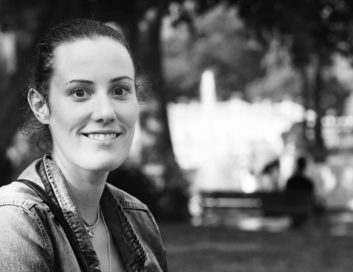
Those are two, rather old, examples of where voice control doesn’t work. The problems of voice control are well known, but with the rise of the smart speaker the future is most surely voice-controlled so how does your station work with the voice? Can listeners find you? Or is your name and frequency too difficult to find on a voice-controlled device or in a device-controlled system in the car?
MORE WORK
Some stations are working on their smart speaker future and with the major smart speaker manufacturers to try and ensure that no matter the listener’s accent, the many ways the station is named (e.g. name/frequency/abbreviation), the speaker gets to the right place and you don’t lose listeners.
The sound of someone’s voice needs to be understood and, radio stations need to do more work to ensure they are the first on the list when “Alexa play…,” is uttered.
The revolution is happening or has happened depending on whom you talk to in terms of the sound of podcasting, “800,000 valid podcasts are now available in Apple Podcasts.”
In addition, the explosion of the podcast market continues with new players entering, new forms of production and a media truly open to all with a microphone and the ability to stand the heat of sitting under a duvet while recording their podcast (production method suggest by “Beef and Dairy Network Podcast” Ben Partridge, RDE Podcast Day 2019) — though apparently kids tents with a duvet over the top works just as well.
The sound of short, home produced podcasts though, like the early days of YouTube videos, are now moving on. With more production houses entering the market the sound of podcasts are becoming more professional, more stylized and may be losing some of the previously and joyously bad production which marked out podcasts in the early days.
That’s not to say that there still aren’t a lot of people out there desperate to know which microphone to use? What makes a podcast sound like a winner is becoming the Holy Grail: How do you make your podcast stand out in a market place where many new podcasts are launched daily?
The sound of the radio in terms of diversity and equality remains an area that needs to be tackled head on in all countries. More stations need more female voices and those from multicultural backgrounds. As local communities diversify so too must radio, bringing a wealth of opinions, experiences and familiarity to their listeners.
If the “woke” generation is the audience of tomorrow, then radio needs to appeal to them and bring the sound of their generation to radio. Podcasts in this respect cater to this demographic bringing with them the multisound world that should be the goal of all stations.
GATE-KEEPER PLATFORM
What is the next big thing for sound? In every space the sound you hear is a key part of the experience. But how do you deliver that sound? Will it be on 5G in the future? In the United Kingdom, mobile network operator and internet service provider, EE, has 5G coverage in over 50 towns at the end of 2019; in the United States Verizon 5G has gone live in parts of 31 cities; and in Australia Telestra covered 10 major cities by the end of 2019, according to TechRadar.com. A similar story in many other markets, 5G is coming to listeners and quickly.
Broadcasters are eagerly exploring how they can deliver more on the mobile networks but the issue of a “gate keeper” for your station’s sound is once again being discussed. Also, the question arises: Will listeners pay for radio streaming?
In a recent study by Imperial College London, researchers found “the evolution of modern culture, including pop music, is just as slow as biological evolution.” What do changing tastes mean for music stations? If smart speakers are outselling traditional radio devices what does that mean for radio? If the car of the future is autonomous what will radio sound like?
These are just some of the questions facing radio today. Making “sound” decisions for a station is the preoccupation for every CEO, head of radio and program director. Competition for the ear is growing, though radio still remains in a strong position, how do you navigate this new world of sound?
Sound ideas and sound decisions on all platforms, across all innovations in technology are paramount. Radiodays Europe in Lisbon, now slated for December, will address these issues with examples from radio stations worldwide with a view to ensuring the sound of radio continues to hit the right note.







